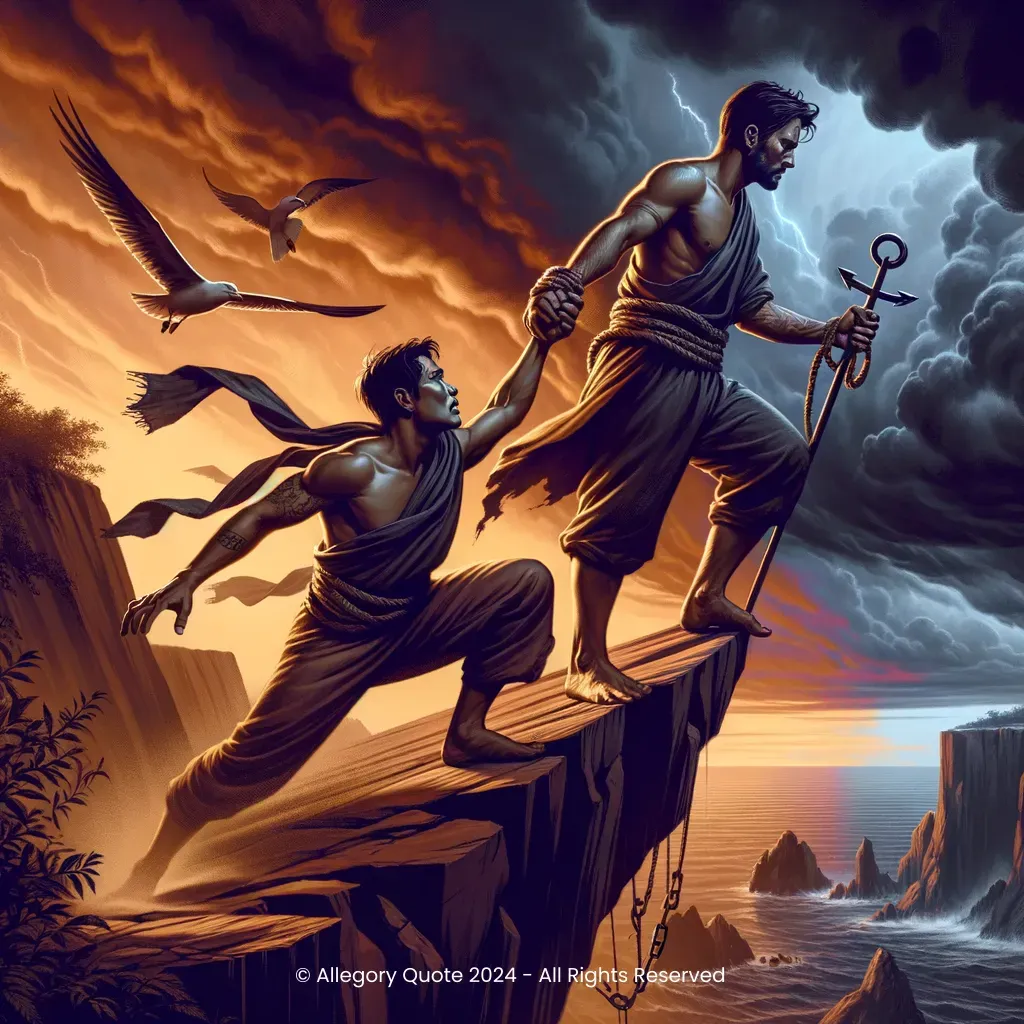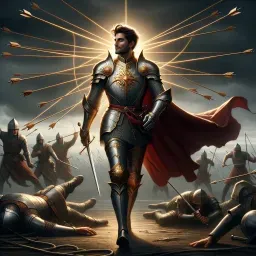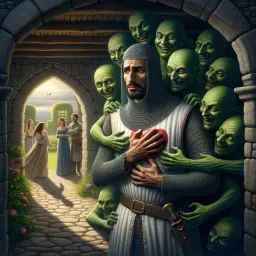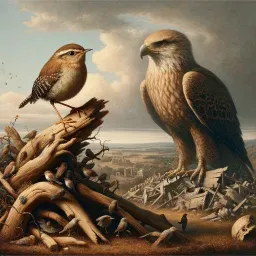”A friend should bear his friend'
s infirmities, but Brutus makes mine greater than they are“

0
0
0
0
- Meaning
- At its core, the phrase signifies that true friendship involves accepting and supporting each other through weaknesses and faults. However, Cassius feels that Brutus, instead of standing by him and understanding his flaws, magnifies them, worsening Cassius's emotional burden. Philosophically, this phrase touches on the expectation of loyalty and understanding in friendships. Psychologically, it illustrates how critical judgment from someone close can feel more hurtful compared to the same criticism from an outsider, because of the trust and support typically expected from friends. Historically, friendships have always been seen as bonds where mutual support and acceptance of faults are crucial. Betrayal or criticism from a friend can feel like a profound breach of this bond.
- Allegory
- The friends on the cliffside represent the delicate balance of trust and support in close relationships. The one reaching out symbolizes the ideal friend who offers stability and help during tough times. The dark, stormy sky represents conflicts and misunderstandings that can arise in friendships. The vulnerable look in the eyes of the slipping friend represents the pain of feeling judged and unsupported. The lush yet rugged landscape encapsulates the journey of friendship, beautiful yet requiring effort to navigate. The anchor signifies the steadiness required in true friendships, while the broken chain poignantly symbolizes the hurt of perceived betrayal. Warm yet strong colors evoke emotions of love, hope, and the complexities of friendship.
- Applicability
- This phrase teaches us an important lesson in personal relationships about empathy and support. In daily life, it reminds us to be understanding and kind to our friends, accepting their shortcomings. Criticizing or belittling friends can sever trust and deepen their insecurities. Collective strength in friendship involves lifting each other up rather than tearing each other down.
- Impact
- Shakespeare's "Julius Caesar" has had a lasting impact on culture and literature, with this phrase highlighting the timeless human experience of friendship and betrayal. The dynamics between Brutus and Cassius have inspired countless discussions on loyalty and the moral complexities of political ambition. This phrase is often cited in literary analyses and discussions about the nature of true friendship and the emotional impact of betrayal.
- Historical Context
- "Julius Caesar" was written and first performed around 1599. The political and cultural context of Elizabethan England, with its own anxieties about power, betrayal, and loyalty, deeply influenced the themes of Shakespeare's plays. Elizabethan society grappled with issues of political legitimacy and the consequences of conspiracy and rebellion, much like the turmoil depicted in "Julius Caesar."
- Criticisms
- While the phrase itself is not particularly controversial, the interpretation of characters within "Julius Caesar" has sparked myriad debates. Critics have argued over the blameworthiness and moral integrity of Brutus and Cassius, reflecting broader discussions on ethics and human behavior. Some could argue that Cassius's view is subjective, and Brutus's actions, whether interpreted as betrayal or moral righteousness, complicate a simplistic understanding of friendship.
- Variations
- There are variations of this phrase that appear in different translations and interpretations of "Julius Caesar." Different cultures may emphasize varying aspects of friendship, such as loyalty, communal support, or the social responsibilities of individuals within friendships. In addition, perspectives on how friends should address flaws and shortcomings can differ widely across cultures.
-

The empty vessel makes the loudest sound.
-

I bear a charmed life.
-

O, beware, my lord, of jealousy; It is the green-ey'd monster which doth mock the meat it feeds on.
-

A little more than kin, and less than kind.
-

O, had I but followed the arts!
-

The world is grown so bad, that wrens make prey where eagles dare not perch.
-

The evil that men do lives after them; the good is oft interred with their bones.
-

If you can look into the seeds of time, and say which grain will grow and which will not, speak then to me.
-

They do not love that do not show their love.
-

I will wear my heart upon my sleeve for daws to peck at.
-

Men at some time are masters of their fates.
-

Uneasy lies the head that wears a crown.
No Comments